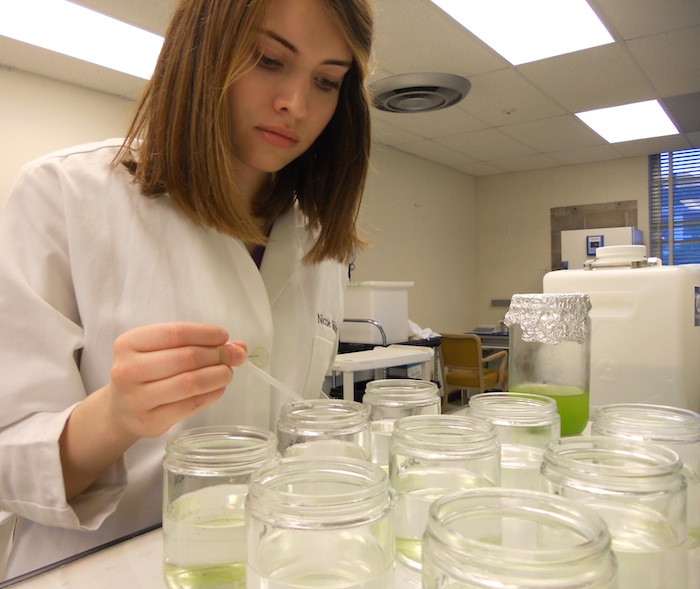Bio soph gets minor planet named after her
08-05-2014

College of Science students are no strangers to honors and accolades.
Many are recognized campus-wide while some get national awards. Biological Sciences sophomore Nicole Biddinger's latest accomplishment is literally out of this world.
Thanks to Pre-Purdue research she conducted in labs at Oklahoma State University and at her high school in Bartlesville, Okla., a minor planet formerly known simply as 28848 was named in Biddinger's honor: Nicolemarie resides almost 300 million miles from the sun between Mars and Jupiter. A minor planet is an object that orbits the sun but is not classified as a comet or large enough to be a planet. About 620,000 minor planets are known to exist in our solar system.
While the thrust of Biddinger's pre-Purdue research surrounded the effects of climate change on the genetic evolution of near microscopic daphnia, a type of plankton commonly known as water fleas, the judges at the Intel International Science and Engineering Fair and a committee from the Lincoln Lab at MIT deemed her work astronomical.
Question: How does it feel to have a planet named after you?
Answer: Research has always served as the outlet enabling me to pursue my passion for science, so receiving the news that minor planet 28848 was named in my honor for achievement in the work I love so much was both incredibly humbling and exciting. Very few people have a minor planet named in their honor, so I feel blessed to be among such a prestigious group of amazing individuals like Albert Einstein and Marie Curie who have contributed so much to science and society. At the same time, it's important to recognize that research in science is far from a solitary act, so this honor would not have been possible without the support of so many wonderful mentors who guided along the way, for which I'm especially grateful.
Q: What was the timeline on this honor?
A: Receiving this honor was a result of the research I conducted in Oklahoma that I presented at several competitions and conferences last year. In May of 2013, I presented my work at the Intel International Science and Engineering Fair (ISEF) – the world's largest international pre-college science competition – that brought together nearly 1,700 students from 70 countries around the world. I was awarded first place in my category, and along with the other top award winners, was informed that MIT rewards a select group of outstanding students and teachers with a minor planet named after them through their Ceres Connection Program, which is an initiative encouraging studies in science. A 13-person committee composed of prominent astronomers from around the world then judges selected honorees, and fewer than 15,000 individuals have been recognized with a minor planet in their name. It was after returning home from my spring semester at Purdue that I received the letter and certificate from Lincoln Laboratory at MIT informing me that I am now among this group of people.
Q: Where exactly is your planet?
A: Minor planet (28848) Nicolemarie is located in the main-belt between Mars and Jupiter. Hundreds of thousands of minor planets have been discovered within our solar system, and the majority of minor planets can be found there, as NASA believes they formed 4.5 billion years ago when the solar nebula collapsed. According to the NASA Jet Propulsion Laboratory small-body tracking database, my minor planet is located 297,458,583 miles from our sun.
Q: How is your summer going so far? Are you back in the lab?
A: After a transitional first year at Purdue, I've spent the summer back in the lab at Oklahoma State University while taking a class on the side as well. This marks my third summer working on research with daphnia, and I couldn't be happier to be back in the lab that helped spark my love of research. It's been a long and exciting journey over the course of these past few years, and it will hopefully be culminating in a completed manuscript by the end of this year.
Q: What are you looking forward to the most during your sophomore year? What goals do you have?
A: This fall, I am serving as a mentor through the Honors College for their freshman seminar course, so I'm looking forward to having the chance to give back and serve students like myself through my time as a mentor. When I began my freshman year at Purdue last semester, I arrived on campus brimming with excitement about the start of a new chapter of my life, but also an anxiety about being eleven hours away from home in an unfamiliar place. Over the course of my first year, my honors mentor fostered an environment that grew our class of eighteen students into a small family, and that kind of bond with a group of incredibly talented and caring individuals made my transition easier, so I hope to provide that same nurturing learning environment for incoming students as well.
This fall, I will be continuing work in Dr. Esteban Fernandez-Juricic's lab, and while it is vastly different from the research I have conducted in Oklahoma, it's been a wonderful opportunity to be exposed to other areas of research within biology and I've enjoyed my experience so far.
I also hope to continue to perform well academically while maintaining a better balance between my studies and extracurricular activities. Purdue has so much to offer, so I'm striving to explore more of the opportunities available to students on campus and also be more involved in the surrounding community this year.
Article published in the Summer 2014 edition of the College of Science E-Newsletter.